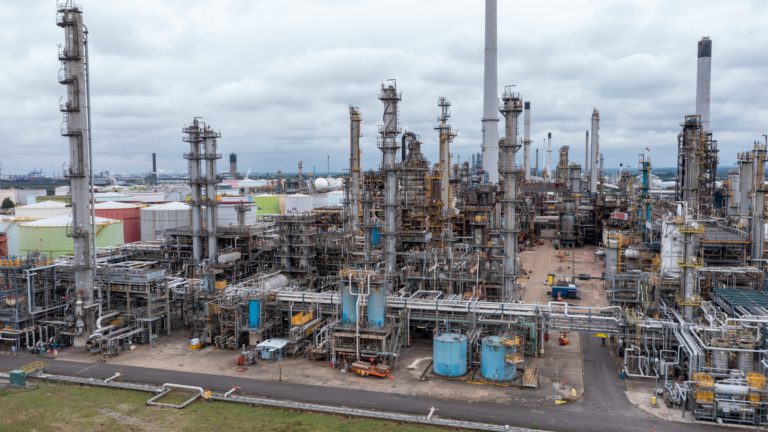
Energy Minister Michael Shanks confirmed in a statement on Monday that no buyers have emerged for the “untenable” facility.
“After a thorough process to determine whether a sale was possible, no credible offers have been made to purchase the entire refinery, and it will be winding down operations,” Shanks said.
In a written statement, the Energy Minister said that the refinery will process crude until the end of the month, and the official receiver will sell refined fuels for a “number of weeks” to allow customers time to manage their supply chains.
One of only five major refineries left in the country, the site is now headed for closure, putting an estimated 420 jobs at risk across the workforce – a figure closer to 1,000 if contract workers and the supply chain is included.
A blow to local jobs
Located in Immingham, North Lincolnshire, Prax Lindsey currently employs around 420 staff, with phased redundancies expected to commence after October 31. The Energy Minister expressed deep disappointment at the lack of credible bids, and again urged the refinery’s former owners to step forward to compensate affected workers.
Although the government has guaranteed jobs and pay “over the coming months” and is funding a “comprehensive training guarantee” to aid workers transitioning to clean-energy roles, unions and local leaders warn that these pledges fall short.
Energy security under pressure
Prax Lindsey processes around 96,600–113,000 barrels per day – approximately 10 % of the UK’s remaining refinery capacity. Its pending shutdown comes hot on the heels of Ineos’s Grangemouth closure earlier this year, reducing the UK’s major refinery count from six to just four.
Despite reassurances from the Minister that Phillips 66’s nearby Humber refinery and transitioned supply chains should avert immediate shortages, questions linger over longer-term resilience. Shadow ministers warn the UK is teetering on a “precarious” edge, increasingly reliant on imported fuel as domestic production declines.
Deindustrialisation and debt
Prax Group’s collapse follows a run of financial missteps, including a £75 million loss post-acquisition and an estimated £250 million debt owed to HMRC. The duo behind the company, Sanjeev and Arani Soosaipillai, reportedly extracted some £11.5 million in pay and dividends before abandoning ship.
Some critics have raised serious concerns about the government’s delay in intervening, asking why a major taxpayer liability to HMRC did not trigger earlier action. With the Company having fought off questions until June, Labour ministers have vowed to probe the directors for potential misconduct.
Legal filings with the High Court showed that Prax’s parent group State Oil Limited and other Prax companies filed a commercial claim against Soosaipillai on July 11 for a breach of fiduciary duty.
Shrinking domestic refining base
The closure of Prax Lindsey marks the second refinery shutdown in just six months – the earlier Grangemouth closure and the decommissioning of Dalston Terminal leave the UK significantly more vulnerable.
Government has issued assurances around supply as well as energy security. Lindsey is the smallest of the UK’s refineries and located next to the much larger Phillips 66 owned Humber refinery which continues to operate.
Industry insiders warn this signals a worrying trajectory toward deindustrialisation, creating strategic weakness in domestic fuel production.
Industry support – but why too late?
The government recently announced support packages for British steel and other strategic industries – the glaring question now is why such intervention did not come sooner for oil refining, especially in the light of massive unpaid liabilities to HMRC.
There are calls for the government to reverse its “premature” decision and continue to buy crude in order to extend the time to find a viable long-term solution.
Unite the Union general secretary Sharon Graham described the refinery as “critical national infrastructure essential to the UK fuel supply saying: “The government can’t sit on the sidelines any longer.”
Energy Minister Michael Shanks insists that the state has acted swiftly to maintain fuel supplies, secure employee livelihoods, and investigate the leadership of Prax Group. Yet with core refining capacity shrinking rapidly, there are increasing calls for a broader industrial strategy beyond firefighting responses.
What’s at stake?
- Jobs and communities: Hundreds of workers face redundancy, with ripple effects across Lincolnshire.
- Energy security: With just four major refineries left, the UK is highly exposed to supply shocks.
- Financial risk: Who will bear the cost of HMRC debts and worker support? – a question now under keen scrutiny.
Outlook
As the official receiver explores options for site assets, government funding for operating costs and training may slightly cushion the transition. The Energy Minister remains hopeful that a solution will be found “that creates future employment opportunities at the Immingham site”.
However, without a strategic plan to replace or repurpose refining infrastructure, UK fuel security remains at risk.
Image of the Lindsey refinery from Alamy
